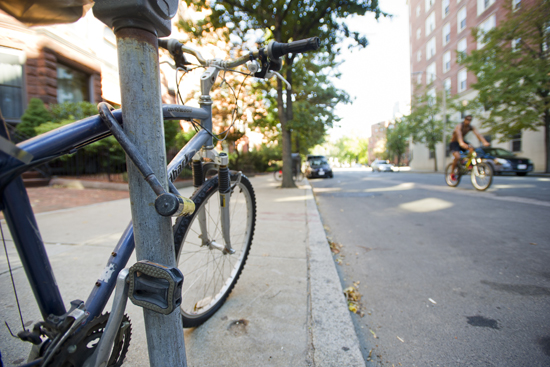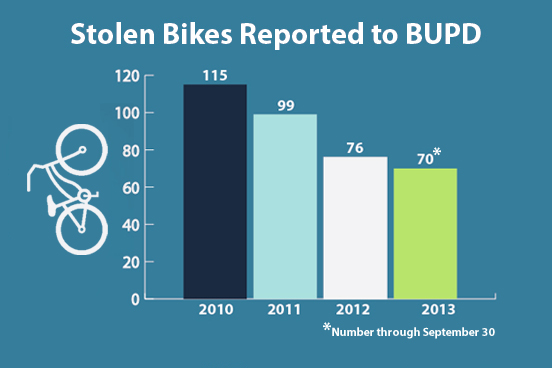Bike Thefts on the Rise
BUPD urges cyclists to use U-type locks rather than chain or cable

U-type locks are the only effective locks against bike thieves, University police say. Photo by Cydney Scott
Betty Huang thought she’d be in and out at CVS—no need to lock her bike. But the line in the store was long that day last month, and she was delayed perhaps 20 minutes. An unpleasant discovery awaited her outside.
“I got my front tire stolen,” says Huang (COM’15).
She was one of the luckier ones. Following last fall’s fluke of fewer-than-usual bike thefts, two-wheelers are vanishing at more typically elevated numbers this autumn, prompting police pleas that students forgo chain and cable locks (the kind Huang had been using) for U-type locks.
The 26 thefts last month are up from just 9 the previous September, but less than the 34 and 45 of the previous two Septembers, according to the Boston University Police Department (BUPD). Last month’s missing bicycles are valued at more than $10,000, almost double the value of the stolen stash last year.
The BUPD is trying a new idea to reduce the number of thefts: installing a GPS device on a “bait bike” that will lead them to the thief if the bike is stolen. The tactic worked last week when police arrested a 45-year-old man who had cut the chain lock on the bait bike and swiped it, BUPD Chief Thomas Robbins says. There were several thefts after the arrest, and the police have no suspects in this fall’s other robberies. The BUPD plans to roll out a second bait bike over the weekend.

“It’s not typically BU students” who are the thieves, Robbins says. “It’s nonaffiliates of BU, and it’s a crime of opportunity.” Thieves have been targeting bike locations at 595 and 704 Commonwealth Avenue in particular, although thefts have been occurring campus-wide.
Last week’s case-cum-arrest illustrated the ineffectiveness of chain and cable locks, Robbins says. In several instances this fall, thieves have cut the chain, moved the bike to another bicycle stand, and returned later to remove it, he says.
BUPD officers remain puzzled by the sharp decline in bike thefts in fall 2012. “We haven’t been able to put a finger on why there was a downward spike,” Robbins says, other than a possible, unexplained drop in students’ reporting stolen bikes. Officer Peter Shin of the department’s Crime Analysis Unit says bike thefts throughout all of last year were so low that at the current theft rate, this year’s “will exceed all reported bike thefts in 2012 by the end of October.” (See accompanying chart above.)
Robbins hopes that a handful of thieves are responsible for the stealing spree, because in the past, one or two arrests in such cases have dramatically cut the thefts.
In the video above, Scott Paré, BU’s deputy director of public safety and BUPD deputy chief, discusses steps you can take to prevent your bike from being stolen.
Besides using U-locks, which can cost as little as $35, the BUPD offers these tips:
Don’t lock just one tire to a stand with your U-lock—rather, lock the frame as well. Some bikes are stolen for parts to sell to theft rings, and thieves are happy to part the bike from its locked tire and leave the latter behind, according to Robbins.
“I lock my bike with a U-lock around the wheel and frame,” says Matthew Hapenney (CAS’16). “I do it as an extra precaution. Luckily, I haven’t had any parts stolen. Hopefully, that doesn’t change.”
Register your bike with the University. Registered bikes get a number decal that facilitates retrieving your bike if the police find it.
Use bike racks to park your bicycle and use BU’s indoor storage spaces for overnight parking.
Katie Strelitz (SHA’14, SMG’14) once locked her bike to a parking meter. She’d had the bike just a week, she says, and someone “cut my brakes.” Bike racks aren’t ironclad—Strelitz also lost a tire to a thief when she’d locked her bike to a rack—but police say that racks are safer than makeshift parking arrangements like meters.
If you see suspicious loiterers or behavior near bike parking areas, alert the BUPD.
Sonia Su (COM’15) and Irene Berman-Vaporis (COM’14) contributed to this story.
Comments & Discussion
Boston University moderates comments to facilitate an informed, substantive, civil conversation. Abusive, profane, self-promotional, misleading, incoherent or off-topic comments will be rejected. Moderators are staffed during regular business hours (EST) and can only accept comments written in English. Statistics or facts must include a citation or a link to the citation.